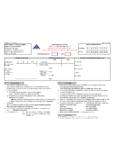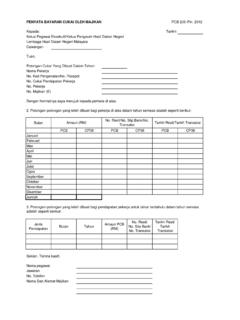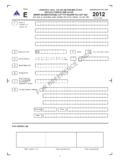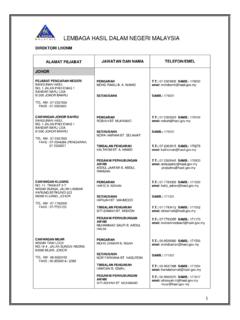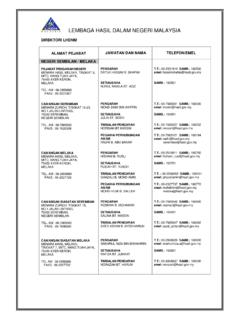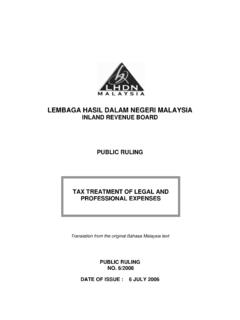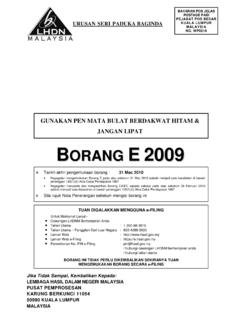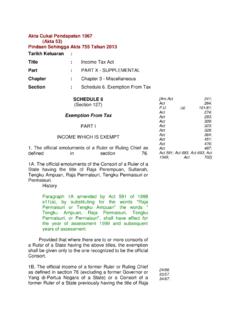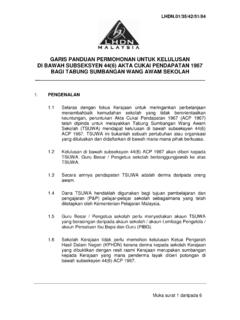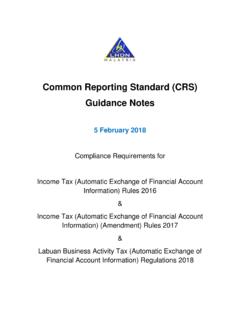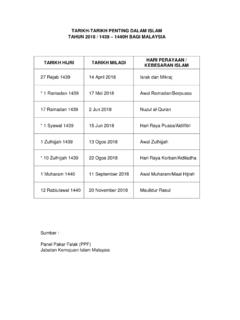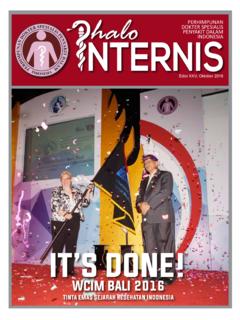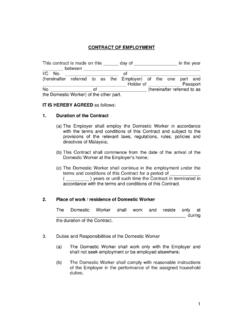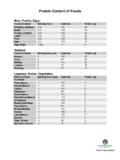Transcription of LEMBAGA HASIL DALAM NEGERI INLAND …
1 LEMBAGA HASIL DALAM NEGERI . INLAND revenue board . PUBLIC RULING. TAX TREATMENT OF. LEAVE PASSAGE. Translation from the original Bahasa Malaysia text. PUBLIC RULING NO. 1/2003. DATE OF ISSUE: 5 August 2003. TAX TREATMENT OF. LEAVE PASSAGE. INLAND revenue board . MALAYSIA. Public Ruling No. 1/2003. Date of Issue: 5 August 2003. _____. CONTENTS. Page 1. Interpretation 1. 2. Leave passage benefit not assessable as an employment income 2. 3. Leave passage benefit assessable as an employment income 3. 4. Leave passage expenditure incurred by the employer for his employee 4. DIRECTOR GENERAL'S PUBLIC RULING. A Public Ruling is issued for the purpose of providing guidance for the public and officers of the INLAND revenue board . It sets out the interpretation of the Director General of INLAND revenue in respect of the particular tax law, and the policy and procedure that are to be applied. A Public Ruling may be withdrawn, either wholly or in part, by notice of withdrawal or by publication of a new ruling which is inconsistent with it.
2 Director General of INLAND revenue , Malaysia ii TAX TREATMENT OF. LEAVE PASSAGE. INLAND revenue board . MALAYSIA Public Ruling No. 1/2003. Date of Issue: 5 August 2003. _____. 1. This Ruling explains the tax treatment of: (i) leave passage provided for the employee by or on behalf of his employer as a benefit or amenity taxable under gains or profits from an employment; and (ii) expenditure incurred on leave passage provided to the employee by the employer in ascertaining the adjusted income of the employer. 2. The related provisions are subparagraph 13(1)(b)(ii) and paragraph 39(1)(m) of the Income Tax Act, 1967 [hereinafter referred to as the Act]. 3. The words used in this Ruling have the following meanings: "Members of his immediate family" means his wife or wives and his children or her husband and her children. "Child" means a legitimate child or step-child of an individual or his wife or a child proved to the satisfaction of the Director General to have been adopted by the individual or his wife in accordance with any law.
3 "Leave passage cost" means cost of fares. "Employer", in relation to an employment, means- (a) where the relationship of master and servant subsists, the master;. (b) where that relationship does not subsist, the person who pays or is responsible for paying any remuneration to the employee who has the employment, notwithstanding that that person and the employee may be the same person acting in different capacities. "Employee", in relation to an employment, means- (a) where the relationship of master and servant subsists, the servant;. (b) where that relationship does not subsist, the holder of the appointment or office which constitutes the employment. "Employment" means- (a) employment in which the relationship of master and servant subsists;. (b) any appointment or office, whether public or not and whether or nor that relationship subsists, for which remuneration is payable. _____. Translation from the original Bahasa Malaysia text Issue: A Page 1 of 5. TAX TREATMENT OF.
4 LEAVE PASSAGE. INLAND revenue board . MALAYSIA Public Ruling No. 1/2003. Date of Issue: 5 August 2003. _____. "Leave passage" means travelling during a period of absence or vacation from duty or employment. "Local leave passage" means travelling within Malaysia. "Overseas leave passage" means travelling between Malaysia and any place outside Malaysia. 4. Generally, any benefit or amenity provided for the employee by or on behalf of his employer would be subject to tax as gains or profits from an employment. 5. Subparagraph 13(1)(b)(ii) of the Act provides that not all benefits in the form of leave passage will be included as assessable income of the employee. 6. Any expenditure incurred by an employer in the provision of a benefit or amenity for his employee consisting of a leave passage within or outside Malaysia is not allowed as a deduction in ascertaining his adjusted income [paragraph 39(1)(m) of the Act]. 7. This Ruling gives general guidelines on: conditions where a benefit or amenity in the form of leave passage does not constitute assessable employment income.
5 Situations or circumstances where a benefit or amenity in the form of leave passage can be treated as gains or profits from an employment and charged to income tax under paragraph 13(1)(b) of the Act; and the treatment of leave passage expenditure whether within or outside Malaysia incurred by the employer for the benefit of his employee as a non- allowable deduction under the provisions of the Act. 8. Leave passage benefit not assessable as an employment income A benefit in the form of leave passage is not assessable as an employment income under the following conditions: (i) leave passages for travel within Malaysia not exceeding three times in any calendar year; or (ii) one leave passage for travel between Malaysia and any place outside Malaysia in any calendar year, limited to a maximum value of three thousand ringgit. The leave passage benefit, however, is confined only to the employee and members of his immediate family. Example 1. Encik Abdullah is entitled to a yearly leave passage benefit amounting to RM5, under the terms of his employment agreement.
6 In January 2003, he travelled to _____. Translation from the original Bahasa Malaysia text Issue: A Page 2 of 5. TAX TREATMENT OF. LEAVE PASSAGE. INLAND revenue board . MALAYSIA Public Ruling No. 1/2003. Date of Issue: 5 August 2003. _____. Mauritius and the total leave passage cost claimed by Encik Abdullah was RM2, Encik Abdullah is exempted from tax on leave passage benefit amounting to RM2, in the year 2003 for the year of assessment 2003. Example 2. Encik Ng is entitled to a yearly leave passage benefit of RM5, from his employer. He made use of that benefit to go on a trip to Pulau Pinang with his wife and two young children during the festive season school holidays in January 2003. The whole family also went on a holiday to Singapore in March 2003. His employer paid him a total local leave passage cost of and overseas leave passage cost of RM1, for the trips. Encik Ng is exempted from tax for both the local and overseas leave passage benefit amounting to RM2, in the year 2003 for the year of assessment 2003.
7 Example 3. Puan Salmah is entitled to a yearly local leave passage benefit of RM6, according to the terms of her employment agreement. In the year 2003, Puan Salmah went on three separate holiday trips with her husband and six children to Kuching, Kota Kinabalu and Melaka and she claimed local leave passage cost of RM5, from her employer. Puan Salmah is exempted from tax for the three local leave passage benefit amounting to RM5, in the year 2003 for the year of assessment 2003. 9. Leave passage benefit assessable as an employment income Leave passage benefit, received by the employee from the employer, which does not fall within paragraph 8 above is subject to tax under paragraph 13(1)(b) of the Act as gains or profits from an employment. Example 4. Using the above Example 1 in paragraph 8, Encik Abdullah and his wife went on another overseas holiday trip in the year 2003 to Indonesia for which he made a claim for leave passage cost of RM1, from his employer. Encik Abdullah is assessable to tax on overseas leave passage cost amounting to RM1, in the year 2003 for the year of assessment 2003.
8 (Note: If there are two or more overseas leave passages in the same year, then the higher cost of the leave passage is exempted limited to a maximum value of RM3, ). Example 5. _____. Translation from the original Bahasa Malaysia text Issue: A Page 3 of 5. TAX TREATMENT OF. LEAVE PASSAGE. INLAND revenue board . MALAYSIA Public Ruling No. 1/2003. Date of Issue: 5 August 2003. _____. Encik Chelliah is entitled to a yearly overseas leave passage benefit of RM4, from his employer. He made use of that benefit to go on holiday to Australia accompanied by his father in the year 2003. His overseas leave passage cost amounted to RM2, per person and his employer paid him a total overseas leave passage cost of RM4, for the trip. Encik Chelliah is exempted from tax on overseas leave passage benefit amounting to RM2, expended on himself in the year 2003 for the year of assessment 2003. He would however be taxed on the remaining leave passage benefit expended on his father. Example 6. Puan Rina is entitled to a yearly overseas leave passage benefit of RM10, and local leave passage benefit of RM5, according to the terms of her employment agreement.
9 In the year 2003, Puan Rina went on an overseas holiday trip with her husband to Italy and made a claim for overseas leave passage cost of RM7, She also went on four local holiday trips to Pulau Langkawi, Pulau Tioman, Pulau Pangkor and Pulau Redang with her husband and three children in the year 2003 and made a claim for local leave passage cost of for each trip. Puan Rina is exempted from tax on the overseas leave passage benefit of RM3, in the year 2003 for the year of assessment 2003 but would be taxed on the remaining amount of RM4, She is also exempted from tax for up to three local leave passage benefit amounting to RM1, in the year 2003 for the year of assessment 2003 but would be taxed on the remaining local leave passage benefit. (Note: If there are four or more local leave passages in the same year, then the three most expensive passages are exempt). 10. Leave passage expenditure incurred by the employer for his employee Any expenditure incurred in the provision of a benefit or amenity by the employer to his employee consisting of a leave passage within or outside Malaysia is not deductible in arriving at the adjusted income of his business as it is specifically disallowed under paragraph 39(1)(m) of the Act.
10 Where leave passage cost given by the employer to the employee includes cost of food, accomodation or other incidental expenses, only the amount relating to fares is treated as leave passage cost. The cost of food and accomodation is deductible as entertainment expenses in arriving at the adjusted income of the employer's business. The amount deductible is restricted to the amount spent on his employees only. Example 7. _____. Translation from the original Bahasa Malaysia text Issue: A Page 4 of 5. TAX TREATMENT OF. LEAVE PASSAGE. INLAND revenue board . MALAYSIA Public Ruling No. 1/2003. Date of Issue: 5 August 2003. _____. Encik Robin's employer paid him an overseas leave passage cost for travel to Australia under a packaged tour in the year 2003. The air fare for the trip amounted to RM2, whereas accomodation amounted to RM1, Encik Robin's employer is not allowed any deduction on the cost of air fare amounting to RM2, but is allowed a deduction for the accomodation cost of RM1, for the year of assessment 2003.
